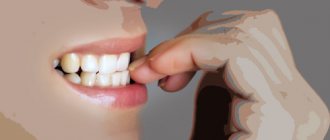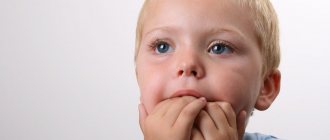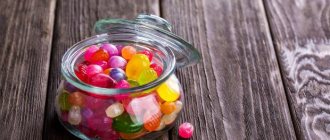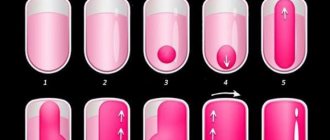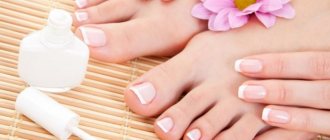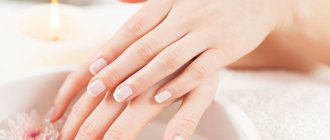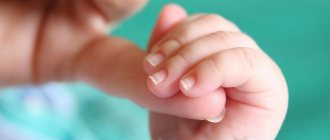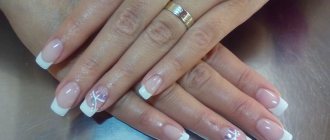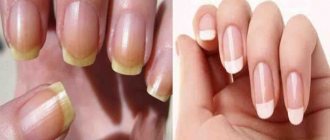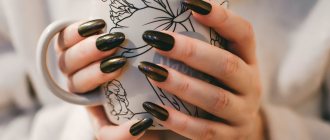Did you know that the habit of biting your nails has a medical name? This is onychophagy. It manifests itself as obsessive biting of the free edge of the plate, hangnails, and cuticle. It is more common in children or adolescents, but also occurs in 15% of adults. Why do people bite their fingernails? Doctors and psychologists are studying the issue, but there is no clear answer yet. The habit is believed to be associated with anxiety and mental disorders.
Causes
Attacks of onychophagia can occur episodically under the influence of provoking factors or be present constantly. Interestingly, the habit of biting nails takes hold very easily. After all, situations where hands are near the mouth occur often. When we prop our heads up while sitting at the table, we think, we yawn.
Some of the reasons why people bite their fingernails include:
- Stress. When a person is nervous, this is how he tries to distract himself. Doing your nails gives you temporary peace of mind, relaxation and even pleasure;
- Concentration of attention. In moments of mental stress and reflection, a person unconsciously begins to bite his nails in an attempt to find a solution;
- Boredom. Sometimes a bad habit is provoked by banal boredom, when, while looking for something to do, a person suddenly comes across his own fingers;
- Psychical deviations. The habit can be a manifestation of obsessive-compulsive, oppositional defiant, major depressive disorder, Tourette's syndrome;
- Hunger. When people start biting their nails when they are hungry, it acts as a distraction.
Experts agree that there is no one universal cause of onychophagia. Rather, a complex of provoking factors is triggered. Some believe that the obsessive desire to bite nails has the same roots as the habit of pulling out hair, biting lips, picking skin, and belongs to the category of neuroses.
Simple tips
Medication and therapy sessions can be combined with simple behavioral strategies.
- Our grandmothers also used this method - they smeared the child’s fingers with some bitter substance - aloe, hot pepper, etc. Now you can buy a special bitter varnish and cover your nails with it.
- Complex and expensive nail design. Most likely, a person will simply feel sorry for ruining a manicure on which he spent time and money.
- Chew gum. The mechanism of operation of this method is simple - the mouth is busy with chewing gum, so biting your nails will be simply inconvenient. Gradually, such a replacement can get rid of a bad habit.
If you have already used similar recommendations, but the obsessive desire to put your hands in your mouth remains, then seek advice from a specialist.
Sources:
Antropov Yu. F., Shevchenko Yu. S. Psychosomatic disorders and pathological habitual actions in children and adolescents.
Yu.S. Shevchenko PATHOLOGICAL HABITATIVE ACTIONS IN CHILDREN (CLINICAL, DYNAMICS, THERAPY).
Why does a child bite his nails?
At 2, 3, 4 and 5 years old, 30% of children have the habit of biting their nails. One explanation for the reasons associates this with the extinction of the sucking reflex. Some babies find it difficult to cope with this period. Unconsciously trying to maintain the reflex, they begin to suck fingers or bite their nails. Especially in moments of stress or overexcitement.
Among adolescents, onychophagia occurs in 45% of boys and girls.
The habit helps children relieve stress, get distracted, or retreat into themselves during the following difficulties:
- uncertainty, low self-esteem, embarrassment;
- excessive demands on the child from parents, teachers or other adults;
- constant quarrels in the family, divorce, cases of domestic violence;
- negative assessment of the child’s behavior or appearance by friends or classmates;
- difficulties with the manifestation of negative emotions when children try to hide or suppress aggression within themselves;
- change of environment, moving, period of adaptation to kindergarten or school, death of a loved one;
- difficulties in communicating with peers, establishing friendships, isolation;
- the desire to be the best, to receive recognition and praise;
- excessive physical, emotional or mental stress.
With these problems, in addition to onychophagia, the child has moodiness, nervousness, sleep disturbances, and appetite. Apathy or aggressive behavior, sharp reactions to the actions of others are possible.
The reason that onychophagia is more common in children than in adults is that children are not aware of the norms of behavior and do not see anything terrible in it. For example, they pick their nose without hesitation in front of everyone. Whereas an adult is stopped by the fact of social condemnation. The same applies to the habit of biting nails in children.
Also, the reason why a child bites his fingernails may be in imitation of adults, older brothers or sisters. If a kid sees someone doing this, he will want to do it too, because the elders are an example and authority for him.
Many who suffer from onychophagia in childhood outgrow this bad habit as they grow older. But if you cannot overcome it, it persists for life.
Consequences of nail biting habit
Understanding that the habit of chewing feet has a psychological component is unlikely to encourage an adult to seek help from a psychologist, and traditional “children’s” methods with mittens and treating fingers with bitter remedies are simply pointless. However, there is one powerful psychological tool that, to some extent, can make a person want to give up the habit - scare the person with its consequences. Moreover, these “horror stories” will be much scarier than those that are invented for children, because an adult understands their validity.
Photo from the site: rastishka.by
So, let's consider the negative consequences that the habit of biting nails can lead to:
- One of the annoying consequences of an addiction is a ruined manicure, or rather a complete lack of opportunity to do it. Judge for yourself, uneven, chewed nails with wounds and hangnails and a beautiful manicure are simply incompatible things. Moreover, it is dangerous to apply decorative coating to such nails; there is a risk of burns or an allergic reaction. Naturally, this consequence is more frightening for women than for men. However, a deformed nail bed and nail plates eaten into meat can also alert the latter.
- In addition to the unaesthetic appearance, biting nails can lead to gastrointestinal problems - from simple indigestion to poisoning. Nails and fingers collect many pathogenic microorganisms that slowly but “systematically” poison the human body.
- Another consequence that evokes disgust and fear in people who bite their nails is helminthic infestation. A person can carry parasite eggs on his hands through poorly processed vegetables, through contact with animals, working with soil, etc. Naturally, few people specifically go to wash their hands with soap in order to indulge in the “pleasure” of biting their nails, hence the risk of infection. In turn, parasites secrete toxins that further poison the body. Treatment for parasites can take a long time.
- Cutting your nails can cause a wound, and an open wound surface is a direct entry point for fungus. As a result, the problem gets worse. After all, in addition to the person himself, his nails will also be “corroded” by an associated fungal infection. All this can lead to complete loss of the nail plates.
- Constant trauma to the nails and soft tissues of the fingers can cause suppuration. Purulent lesions of the periungual area cause excruciating unbearable pain and often require surgical intervention.
- Another unpleasant consequence is the formation of an ingrown toenail. Chipped nails and a deformed nail bed lead to changes in the direction of nail growth, which can eventually grow into the skin. Correcting this defect will require a long time, and in advanced cases, again, surgical intervention.
Perhaps these consequences alone are enough to explain to an adult why chewing feet is dangerous. However, for a comprehensive effect, other techniques should be included. Let's look at them below.
Why do adults bite their nails?
According to statistics, onychophagia occurs to one degree or another in 15% of adults, and among women it is 3 times more common than among men.
According to a number of studies, it turned out that perfectionists are more prone to such a bad habit. If something does not go according to plan, then people striving for perfection get upset, nervous, and lose patience. And to cope with irritation, they bite their nails. And this applies not only to work, but also to personal, family life, relationships with friends.
Why do adults still bite their fingernails?
The reasons may be:
- Sudden nervous tension;
- Chronic stress;
- Feelings of fear and anxiety. In search of protection, adults return to childhood, remembering bad habits that helped cope with such conditions;
- Thinking about problems or important tasks. While people bite their nails, it is easier for them to concentrate and make decisions. Some people bite not their nails, but a pen cap or simply draw meaningless patterns on paper;
- Mental disorders that are accompanied by a desire to harm or injure oneself. Such people often chew their nails until they bleed, and may even eat the entire plate.
How to get rid of a bad habit?
The serious scale of the spread of onychophagy is evidenced by the fact that in Holland there is even a specialized center for those who want to get rid of this habit and the Institute for Pathological Onychophagy. Treatment there is carried out according to the author's method.
Domestic specialists - dermatologists and psychotherapists - will come to the aid of those who do not have the opportunity to undergo treatment in a specialized center.
It is necessary to treat onychophagia in two directions: to restore the integrity of the nail plates and skin - this will be done by a dermatologist; and eliminating the cause of obsessive actions is a job for a psychologist or psychotherapist.
A dermatologist will most likely prescribe local products (creams, ointments, gels) with anti-inflammatory, antibacterial, and antifungal effects.
And a psychotherapist working with nail-biting addiction has a whole arsenal of methods at his disposal.
- Drug treatment with sedatives, tranquilizers and antidepressants. In cases where there is a pronounced emotional disturbance - anxiety, depression.
- Onychophagia is successfully treated with cognitive behavioral psychotherapy. Since nail biting is associated with suppressed emotions, tension and anxiety, the therapist will focus his activities on working with emotions. It will teach you how to express them in an adequate way, discuss them, and accept them. Together with relaxation and self-control skills, this strategy will lead to complete elimination of the bad habit.
- If a child suffers from onychophagia, the psychologist will work not only with him, but also with his parents. After all, the cause of the disorder could be certain methods of education. New patterns of interaction with the child are needed, based on approval, support and correct criticism.
Why should you not bite your nails or bite off hangnails?
First of all, it's unhygienic. A person who bites his nails causes hostility and condemnation from others. Secondly, onychophagia is a habit that is dangerous to health.
Leads to the following complications:
- Deformation, thinning, delamination of the nail plate, inflammation, suppuration of the skin around the nail;
- Entry into the oral cavity of pathogenic pathogens that are located in the area under the nails and on the fingertips. As a result, a person becomes infected with gastrointestinal infections, suffers from indigestion or poisoning with a high fever;
- Fungus (onychomycosis). Injury to the nail area by bites and a humid environment create favorable conditions for the penetration and proliferation of fungus, which leads to deterioration of the condition of the nails and even their loss;
- Dental problems. The habit causes inflammation of the gums, damage to teeth (chips, displacement, destruction), dysfunction of the temporomandibular joint;
- Ingrown nail. With constant gnawing, the direction of growth of the plate changes, which leads to its ingrowth into the lateral nail folds.
Why else is it harmful and should not bite your nails? Their main function is to protect the end phalanges of the fingers from mechanical damage. If the integrity of the plate is violated, the nail bed will become vulnerable and easily injured.
Causes of bad habit
There is a scientific name for nail biting - onychophagy . Experts say that this habit appears due to neurosis. With severe anxiety, a person subconsciously tries to replace internal tension with something. Some people start biting their nails. This helps to dissipate negative energy and accumulated aggression. As a result, a person manages to be distracted, slightly relax and even calm down.
If we consider onychophagia in detail, we can identify several narrower causes of this problem. Among them, various experts highlight the following:
Reaction to stress
According to one of the popular theories of psychology, nail biting becomes a response to the influence of a stressful situation. This action allows some people to relax, others to calm down, and others to improve their brain activity.
In France, sociologists conducted an interesting experiment. They surveyed local residents, asking them just one question: “In what situations do you start biting your nails?”
The results of the study showed that most French people develop bad habits at work . 26.5% of respondents bite their nails when they think about the tasks set by management or worry about their career, salary, or position.
Slightly fewer respondents said that they often bite their nails while shopping . According to scientists, the reason for the emergence of a bad habit in this case is the agony of choice. Among the remaining responses of respondents, one can highlight thinking about the economic situation in the country, as well as worries about children and parents .
Suppressed desires
One of the theories in neo-Freudianism states that nail biting is nothing more than an analogue of masturbation, only more acceptable in society. For this reason, the bad habit has probably become widespread.
"Inheritance" from parents
There is a widespread belief among people that the habit of biting nails is a hereditary pathology. Allegedly, it is always passed on from parents to children, and nothing can be done about it.
However, genes have nothing to do with it. In reality, every child copies the behavior of adults and adopts their habits. However, it is extremely difficult to eradicate what was ingrained in childhood. So it turns out that people whose parents bite their nails begin to do the same, maintaining this habit into adulthood.
Dissatisfaction with oneself
Someone may say that, although he bites his nails, he does not blame himself for anything. However, the authors of the theory clarify that in this case we are talking about the suppression of feelings. All dissatisfaction with oneself is usually hidden at the subconscious level.
Obsessive-compulsive disorders
In some cases, nail biting is a symptom of obsessive-compulsive disorder. Patients with this disease are haunted by obsessive thoughts . To cope with their anxiety, such people come up with certain rituals that are repeated day after day. Some wash their hands endlessly, others constantly count some items. There are also patients who bite their nails.
Fragility of the nail plate
In most cases, a bad habit in adults appears precisely due to psychological reasons. However, sometimes its occurrence is associated with physiology.
Many people's nail plates become thinner with age. If a nail breaks in a public place where scissors and files are not available, some people decide to replace them with their teeth. Then the person regrets that he gave himself such a manicure, but it is already too late.
How to stop biting your nails: 5 simple steps to break the habit
To stop biting your nails, you need to use more than just pharmaceutical products. Don't leave all the work to them. It is necessary to make independent efforts to cope with the disease. And this is what psychologists recommend.
- To get rid of anxiety, you need to learn to relax. Use music, yoga, meditation. Learn to disconnect from problems and control your own thoughts. Complete relaxation will help you reboot and become calmer and more tolerant.
- You need to keep yourself busy. Often, chewed nails are the result of not only stress, but also boredom. Find hobbies that won't let you get bored.
- Keep in front of you (especially when working at the computer) something that you can chew: sticks, nuts, seeds.
- Ask your acquaintances and friends to reprimand you. The desire to look better in the public eye often has a positive effect on thinking and behavior.
- Use special products to cover your nails, because most often it’s the “bare” ones that get bitten. Once you compact them, the habit loses all meaning because it causes inconvenience.
Causes of nail biting in adults
We are adults, but bad habits remain from childhood. After all, the weakness called “biting my nails” remains in adults as a subconscious reflex. A grown man would not suck his thumb in front of most people like a small child. However, he will not mind chewing his nail plates at a time of anxiety and nervousness.
Therefore, the following reasons are identified that encourage adults to engage in this childhood habit:
- strong excitement and nerves - experiences that every adult experiences when waiting for a decision that affects his future fate;
- the chewing reflex indicates a lack of self-control over your stomach, which provokes biting your own nails;
- replacing lip biting with the action of biting nails;
- severe stress;
- state of thoughtfulness;
- hereditary traits;
- lack of keratin.

